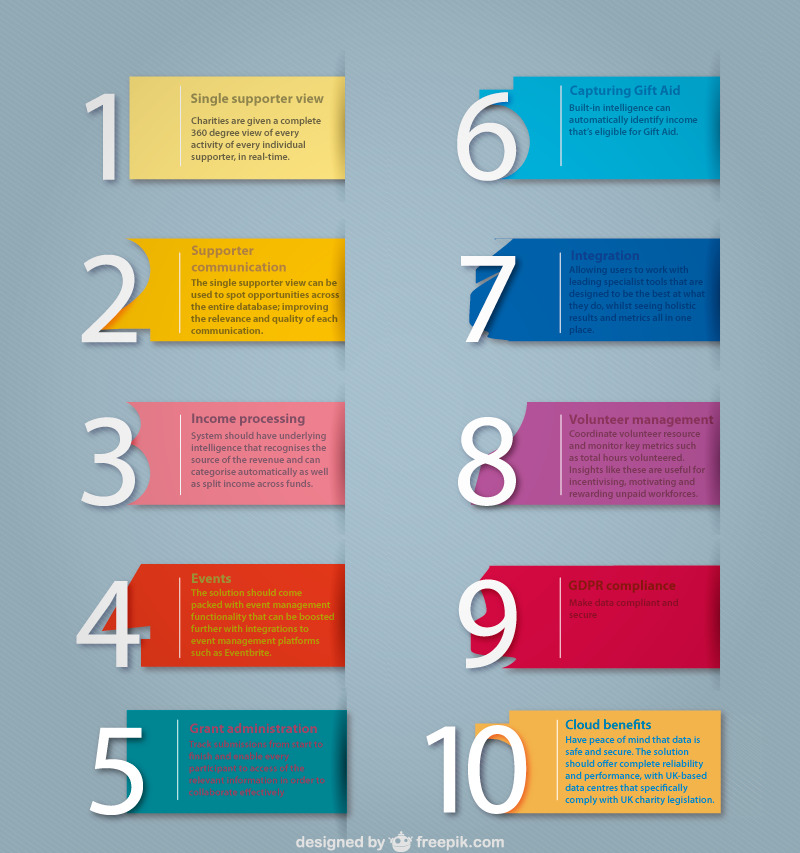The plethora of engagement methods that now exist for modern charitable organisations puts a heavy strain on fundraising and marketing teams to manage supporter relationships effectively. But maintaining high levels of engagement with supporters, using the mediums they are using daily, has become more valuable than ever. This is why more and more charities are turning to technology to help.
Here are 10 tips on how to effectively manage supporter relationships with technology:

10 ways to effectively manage supporter relationships with technology
1. Single supporter view and donor management
When supporters communicate with organisations, they expect the representative they are dealing with to have instant access to every relevant piece of information there and then. By using a good Customer Relationship Management (CRM) tool, charities are given a complete 360 degree view of every activity of every individual supporter, in real-time.
2. Supporter communication
There is a set number of supporters and prospective supporters that charities can incorporate into their communications strategy. That in turn, limits the number of campaigns and the number of times they can reach out to their database before messaging becomes ineffective. With a CRM solution, the single supporter view can be used at a holistic level to spot trends and opportunities across the entire database, therefore improving the relevance and quality of each communication.
3. Income processing
How charities manage income streams is a key differentiator that separates them from conventional businesses. Income processing for charities is a major obstacle for fundraising teams and finance departments alike. A CRM solution should have underlying intelligence that recognises the source of the revenue – what appeal , campaign and event – and categorises automatically as well as splitting the income across funds.
4. Events
Events play a significant role in the fundraising and marketing strategy of charities, regardless of the size of charity. The challenge is how to digitally capture all the engagement opportunities that physical events create across volunteers, supporters, donors and prospects. A good CRM solution should come packed with event management functionality that can be boosted further with integrations to event management platforms such as Eventbrite.
5. Grant administration
Grant management processes are often considered a sticky subject for charity senior management teams, especially when the application isn’t successful. The right CRM solution should be able to track submissions from start to finish and enable every participant to access the relevant information in order to collaborate effectively.
6. Capturing Gift Aid
To accurately calculate and process Gift Aid (or Tax Efficient Giving) is no easy feat. CRM solutions should have built-in intelligence to automatically identify income that’s eligible for Gift Aid. They should also be able to create a claim which can be audited and submitted to HMRC.
7. Integrating with third-party software
All the different disciplines and sales and marketing practices cannot be effectively addressed by a single CRM solution. The answer lies in integration. A good CRM solution will seamlessly integrate with relevant third parties. This allows charities to work with leading specialist tools that are designed to be the best at what they do, whilst allowing users to see the holistic results and metrics all in one place.
8. Managing volunteers
Volunteers are invaluable to the operation of charities, so to get the most of their volunteer base, they should demonstrate appreciation with positive actions. An effective CRM solution should enable charities to coordinate volunteer resource and monitor key metrics such as total hours volunteered. Insights like these are useful for incentivising, motivating and rewarding unpaid workforces.
9. Achieving GDPR compliance
To adhere to GDPR, charities are having to make drastic changes to the way that data is handled. A CRM solution can help here by making data compliant and secure.
10. Cloud benefits
By choosing a solution that is based in the cloud, charities can have peace of mind that their data – whether that be the data of volunteers, supporters, beneficiaries or major stakeholders – is safe and secure. It should offer complete reliability and performance, with UK-based data centres that specifically comply with UK charity legislation.
For charities to find a CRM solution that helps them to effectively manage supporter relationships and meet many other of their unique requirements can be a tough ask, but there are systems out there that can not only meet but exceed expectations. Once in place, it can transform how charities operate and support them in the delivery of their mission.

